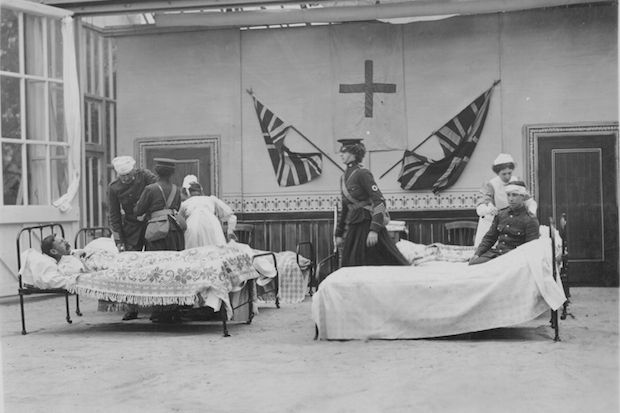From The Spectator, 19 September 1914:
WHAT a nefarious little person is the captious critic! His watchword is caution, and he goes about damping down the fires of enthusiasm, only happy when be can hear some aspiring little flame fizzling out.
At present he is enjoying himself hugely. All good people are registering rash vows to be of some use at a supreme crisis, and he is busy explaining to them in detail that it is of no sort of good for them to try. All their attempts, he would have them believe, are defeating themselves. They had better do nothing than what they are doing, he persuades them. Their efforts are involving a very great risk. A woman cannot so much as make a shirt for a sick soldier but he is down upon her.
“Here is she,” he declares, “busily taking the bread out of the mouth of a seamstress. Put the work down at once!” he commands, and nervous listeners comply. Determined not to be altogether baulked, they turn their attention to something else. They give their time to Red Cross work or to seeing after the soldiers’ wives and children. They write reams of letters, they walk miles upon miles, they split their heads with thinking hard for those who, it may be said without injustice, seem incapable of thinking for themselves. In like anxiety with the women they visit, they offer sympathy and sustenance as best they may. “Was ever such folly!” says the captions critic.
“Here are armies of clerks and half-trained nurses out of work. Let them write and walk and talk and think, and make a living thereby at the same time.” “We thought we were doing right,” plead the workers. “The work is very arduous. We are not doing it for pleasure, even if we are doing it for love.” “Sentimental nonsense!” says the captions critic. “You ought to pay a substitute to do it for you,” and off he goes to see whether he can discourage a few men. “What are you doing ?” says he. “Trying to get your servants to enlist! It is very unlikely that they will. You are just putting more men out of work for the country to maintain. “Then, as they explain their good intentions, he begins to “cold-water” some one else’s efforts.
“Here are you keeping on men to do your work who ought to be at the front,” he shouts. “But we are keeping them on at a great sacrifice because we thought it right,” they reply. “Right indeed!” says the critic. “It’s you mistaken rigbtdoers who do half the harm that is done in the world!”
The captious critic, however, is not as successful with men as with women. Sometimes when he has been talking only a very short while they will tell him to go and be hanged, and they will patiently get on with what they are doing. Women are more easily made to doubt, especially if they are women of leisure. They are not accustomed to use their whole energies. Just now they would gladly do so, but as they start to work betimes in the morning they find the road picketed by captious critics. The great Trade Union of substitutes forbids free labour, the pickets explain, and a few women creep home convinced, while others push on to work hampered by doubt.





Comments